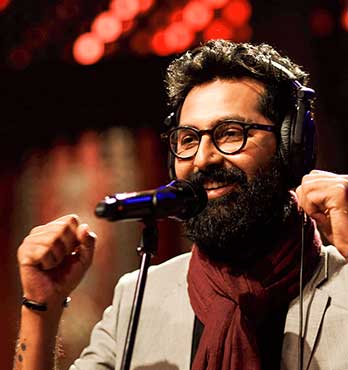Shahab Hussain

by Aliya Shaikh
As a young boy, Shahab Hussain wanted to be a pilot. “When I used to see an airplane in the sky, I would stare at it with a chamak (spark) in my eyes.” But Shahab soon realized that a life in the sky was not meant to be. His aversion towards academics grounded his childhood fantasy, but the desire to soar soon manifested in the form of music. There was the love for music, of course, but at the time, there was also the glitter, the desire to be a star, to have his own tour bus and the world singing his songs that propelled him towards this new interest. The fantasy, the image of it all, the dream of being larger than life was something a young Shahab did not quite understand at the time but looking back, he now realizes where the desire stemmed from; much like his wish for a life in the sky, Shahab always wanted to be somewhere ‘up there’
Singing started becoming a daily hobby, something that Shahab picked up when his family would gather around the television at night and watch Bollywood films. Later, Shahab would memorize the songs and sing them out loud with his brother when no one was watching. “I spent the 90's listening to Bollywood music. That’s where it all started. Even after all these years, those songs are still embedded in me.”
In his adolescent years, Shahab chanced upon Lucky Ali’s album, Sifar, which revolutionized the way he perceived melody, words, and ultimately, the world. He would listen to the songs obsessively, recognizing the one thing the music seemed to be telling him over and over again: ‘ao, be a musician’, this constant inner push eventually changing his relationship with music.
While singing had become second nature to him, Shahab had developed an appreciation for the art of playing instruments that any musician fosters from a young age. Through playing the flute in his school’s march band to trying his hand at drums and picking up the guitar, Shahab began understanding the connection between a musician and his instrument. Shahab’s relationship with the guitar began at the age of 14. With no formal training, he observed, sought advice from friends, and relied on intuition to learn a few chords.
“Sometimes months would pass and I would’ve learnt full songs on those two chords, only to realize that those songs are unplayable on those chords. It’s quite funny actually, now when I think about it.”
And as instruments became the fuel of Shahab’s curiosity, it was words that allowed him to express himself. Even today when he hums, he is singing, “Because hamesha andar ki koi baat nikalne ko tayyar hoti hai (Because there is always something inside, waiting to be told).”
Shahab is an introvert and doesn’t talk much about himself. But when he writes songs, he befriends himself and has a conversation with himself, “I explain things to myself and I try to wake my conscience.” Shahab’s songs are an expression of an inner conversation:
Aasman se baatein karti hain teri baatein,
Kya kabhi tu ne jaagi hain itni raatein?
Ke poora kar sake woh apna khwaab
Jo hai itna lajawab.
Perhaps, Shahab’s connection with music grew deeper at a time when he seemed to have almost lost it. When the band he had created with his friends, Bell, disbanded, Shahab was left in disarray and momentarily disillusioned. The once strong and assured grip he had had, seemed to have loosened and he was forced to ask himself questions regarding his music. There was no longer a comfortable and concrete musical outlet. “It felt like the world had ended.”
But, his journey as a musician had more in store for him. Doors began to open and opportunities soon poured in. Several notable artists approached him to play sessions for their sets and recordings and around this time, one such opportunity led him to be recruited as a backing vocalist in Coke Studio Season 9. A one-man band, Shahab worked on his music, performed solo at small cafés, sometimes with a flute, sometimes with a guitar. An amplifier in one hand, and an instrument in another, Shahab was determined. And as the determination grew, things slowly but surely began to fall into place for the artist.
“Music is something else”, he says. “It plays games with your mind.”
Perhaps it is this game that keeps him hungry, with a chamak (spark) in his eyes and a calm and reassured “hojaayega” (we’ll manage) at the end of each challenge. Shahab is a product of dogged determination and persistence. Because for this artist, music remains a path to the sky, a complete form of liberation and redefining of what’s possible. For Shahab, the sky's the limit.
